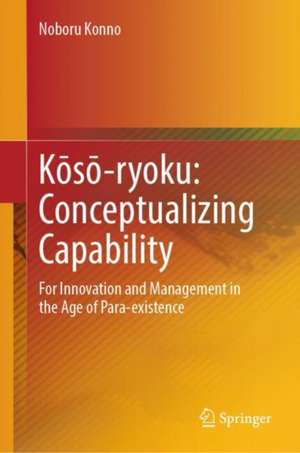Kōsō-ryoku: Conceptualizing Capability: For Innovation and Management in the Age of Para-existence
Autor Noboru Konnoen Limba Engleză Hardback – 4 iun 2024
Japan has experienced the world's earliest capitalist setback and is stuck in a prolonged stagnation. The author maintains, however, that what is needed in this coming chaotic era is not only “imagination”, as it would be called in English, but also the power of creating kōsō, the Japanese term for “formative concept”. The author has a proven track record in research and practice on knowledge creation theory, innovation management, design thinking, and scenario planning. He has reorganized and set forth in this book the perspectives he has proposed under the theme of kōsō-ryoku to present a new methodology of knowledge for living in the twenty-first century.
Preț: 894.46 lei
Preț vechi: 1090.81 lei
-18% Nou
Puncte Express: 1342
Preț estimativ în valută:
171.15€ • 178.70$ • 141.65£
171.15€ • 178.70$ • 141.65£
Carte disponibilă
Livrare economică 15-29 martie
Preluare comenzi: 021 569.72.76
Specificații
ISBN-13: 9789819728305
ISBN-10: 9819728304
Pagini: 228
Ilustrații: XXI, 205 p. 39 illus., 5 illus. in color.
Dimensiuni: 155 x 235 x 18 mm
Greutate: 0.54 kg
Ediția:2024
Editura: Springer Nature Singapore
Colecția Springer
Locul publicării:Singapore, Singapore
ISBN-10: 9819728304
Pagini: 228
Ilustrații: XXI, 205 p. 39 illus., 5 illus. in color.
Dimensiuni: 155 x 235 x 18 mm
Greutate: 0.54 kg
Ediția:2024
Editura: Springer Nature Singapore
Colecția Springer
Locul publicării:Singapore, Singapore
Cuprins
Chapter 1 Eastern Wisdom and the Future.- Chapter 2 From Strategy to Narrative Meaning Creation.- Chapter 3 Innovation as Knowledge Creation.- Part II The Demand for Human Conceptual Ability.- Chapter 4 Logic of Conceptual Ability and Design Thinking.- Chapter 5 Kiyoshi Miki's power of conception and the Sublimation from Kant/Husserl.
Notă biografică
Noboru Konno (KONNO Noboru) is a professor at the Graduate School of Business, Management and Information Science at Tama University. He holds a Ph.D. in Management Information Science. He also served as a specially appointed professor at the Graduate School of System Design and Management (SDM), Keio University. He is the representative of Ecosyx Lab Inc., and the president of the Japan Innovation Network (JIN), a general incorporated association, the founder of the Future Center Alliance Japan (FCAJ), a general incorporated association. He also holds positions as a director of the Knowledge Creating Principle Consortium (KCPC), a general incorporated association. Moreover, he serves as a fellow of the Japan Creativity Society and a board member of The New Club of Paris.
His work revolves around the knowledge ecology of organizations and society. He is involved in leadership education, organizational change for innovation management system, workplace design for research institutions, urban development projects, and other practical endeavors. He has authored and co-authored numerous books and articles.
His work revolves around the knowledge ecology of organizations and society. He is involved in leadership education, organizational change for innovation management system, workplace design for research institutions, urban development projects, and other practical endeavors. He has authored and co-authored numerous books and articles.
Textul de pe ultima copertă
This book examines conceptualizing capability (kōsō-ryoku), the most important ability for thriving in the era of innovation. A new approach, "formative conceptualizing capability," is proposed as the core knowledge methodology for innovation and management, which is is a fundamental human ability that goes beyond the boundaries between cognitive and tangible realities to shape concepts and drive innovation. Traditional studies on imagination in Western philosophy are combined with knowledge creation theory based on Eastern way of thinking. The book argues the capability should be at the core of innovation management, offering insights and principles for navigating the challenges of the present age.
Japan has experienced the world's earliest capitalist setback and is stuck in a prolonged stagnation. The author maintains, however, that what is needed in this coming chaotic era is not only “imagination”, as it would be called in English, but also the power of creating kōsō, the Japanese term for “formative concept”. The author has a proven track record in research and practice on knowledge creation theory, innovation management, design thinking, and scenario planning. He has reorganized and set forth in this book the perspectives he has proposed under the theme of kōsō-ryoku to present a new methodology of knowledge for living in the twenty-first century.
Japan has experienced the world's earliest capitalist setback and is stuck in a prolonged stagnation. The author maintains, however, that what is needed in this coming chaotic era is not only “imagination”, as it would be called in English, but also the power of creating kōsō, the Japanese term for “formative concept”. The author has a proven track record in research and practice on knowledge creation theory, innovation management, design thinking, and scenario planning. He has reorganized and set forth in this book the perspectives he has proposed under the theme of kōsō-ryoku to present a new methodology of knowledge for living in the twenty-first century.
Caracteristici
Provides insights and valuable recommendations for navigating uncertainty Explores the power of formative conceptualization, blending Eastern and Western philosophies Introduces para-existence, a new social and economic model for the upcoming era
